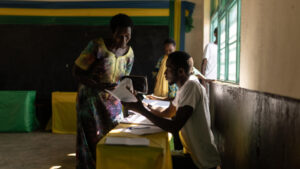A voter casts her ballot at a polling station in Kigali, on July 15, during Rwanda’s presidential and parliamentary elections [Guillem Sartorio/AFP]
Voting Begins
Counting commenced in Rwanda’s presidential and parliamentary elections on Monday. President Paul Kagame is poised to secure another five-year term, continuing his leadership since 2000.
Limited Opposition
Kagame faces only two challengers after several critics were barred from running. First-time voter Gatangaza Bwiza Nelly expressed anticipation about the election’s outcome.
Predictable Outcome
The election mirrors 2017, where Kagame overwhelmingly won with nearly 99% of the vote. Initial results are expected soon after polls closed.
Kagame’s Legacy
Kagame, aged 66 and seeking a fourth term, is credited with rebuilding Rwanda post-genocide, despite criticism of media suppression and political crackdowns.
International Issues
Criticism abroad includes accusations of Rwandan involvement in neighboring Congo’s instability. Allegations of past massacres remain sensitive topics within Rwanda.
Economic Realities
While GDP growth has been robust, nearly half of Rwanda’s population lives on less than $2.15 a day, highlighting economic challenges amidst growth statistics.
Election Dynamics
Over nine million Rwandans were registered to vote, with presidential and legislative elections held simultaneously for the first time.
Electoral System
Kagame’s electoral dominance includes controversial constitutional changes allowing extended presidential terms, potentially up to 2034.
Campaigning Imbalance
Campaign dynamics favored Kagame’s RPF party , marked by extensive support and visibility compared to limited opposition efforts.
Parliamentary Elections
Simultaneously, 589 candidates vie for 80 seats in the Chamber of Deputies, with specific quotas for women, youth, and disabled representation.
Despite challenges and controversies, Rwanda’s election process reflects evolving democratic practices, although criticisms of fairness persist.
